Related Research Articles
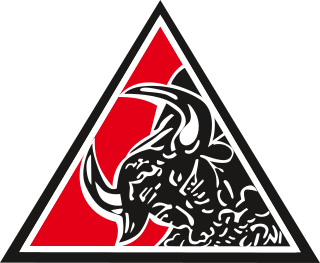
The Indonesian National Party was the name used by several nationalist political parties in Indonesia from 1927 until 1973. The first PNI was established by future President Sukarno. After independence, the new PNI supplied a number of prime ministers, and participated in the majority of cabinets in the 1950s and 1960s. The party was fused into the Indonesian Democratic Party in 1973. In the years following the reforms of the late 1990s, a number of parties claiming to be the continuation of previous PNIs stood in elections, but gained only a handful of seats.
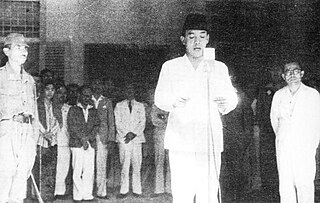
The Proclamation of Indonesian Independence was read at 10:00 Tokyo Standard Time on Friday, 17 August 1945 in Jakarta. The declaration marked the start of the diplomatic and armed resistance of the Indonesian National Revolution, fighting against the forces of the Netherlands and pro-Dutch civilians, until the latter officially acknowledged Indonesia's independence in 1949. The document was signed by Sukarno and Mohammad Hatta, who were appointed president and vice-president respectively the following day.
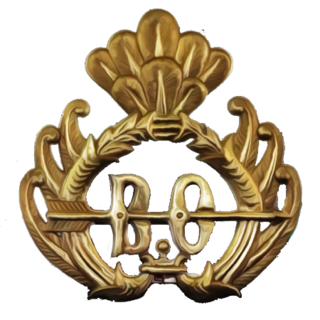
Budi Utomo was an early native nationalist political society in the Dutch East Indies. The organization's founding in 1908 is considered instrumental to the beginning of the Indonesian National Awakening.

The Indonesian National Awakening is a term for the period in the first half of the 20th century, during which people from many parts of the archipelago of Indonesia first began to develop a national consciousness as "Indonesians".

Oemar Said Tjokroaminoto, better known in Indonesia as H.O.S. Tjokroaminoto, was an Indonesian nationalist. He became one of the leaders of the Islamic Trade Union, founded by Samanhudi, which became Sarekat Islam, which they both cofounded.

The Council of Indonesian Muslim Associations Party, better known as the Masyumi Party, was a major Islamic political party in Indonesia during the Liberal Democracy Era in Indonesia. It was banned in 1960 by President Sukarno for supporting the PRRI rebellion.
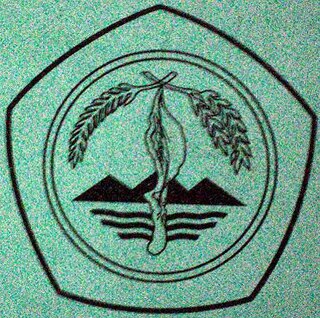
Paguyuban Pasundan is a Sundanese cultural organization that was founded on 20 July 1913, and is one of the oldest organizations in Indonesia that still operates. During its existence, the organization has been moving in the field of education, socio-cultural, politics, economy, youth and women empowerment. Thus, since 13 June 1919, it became political organisation/party, a member of the Association of Political Organisations of the Indonesian People. Paguyuban Pasundan works to preserve the Sundanese culture. There are also members of the Paguyuban Pasundan organisation who reside in the United States with other Indonesian diasporas. In this country, their community is centred in the capital city of Washington DC.

The First Amir Sjarifuddin Cabinet was the fifth Indonesian cabinet and was in office from 3 July to 11 November 1947.

The Second Amir Sjarifuddin Cabinet was Indonesia's sixth cabinet and was the result of a reshuffle to allow for the entry of the Masyumi Party, which gained five posts. The cabinet lasted only two months and eleven days, from 11 November 1947 to 29 January 1948, after Masyumi withdrew its ministers in protest at the Renville Agreement the government signed with the Dutch.

Soekiman Wirjosandjojo was an Indonesian politician and physician who served as prime minister of Indonesia from 1951 until 1952. Additionally, Soekiman served as the first president of the Masyumi Party from 1945 to 1951.

Indonesian Islamic Union Party was an Islamic political party in Indonesia before and after independence. In 1973 it was merged into the United Development Party.

The Soetardjo Petition was a motion of the Volksraad of the Dutch East Indies, instigated by the member Soetardjo Kartohadikusumo, which was submitted as a petition to Queen Wilhelmina and the Estates General of the Netherlands asking for more autonomy.

The Indonesian Political Federation was an umbrella organization of various nationalist organizations in the Dutch East Indies which existed from 1939 to 1942. Founded to unite the nationalist movement, GAPI championed the creation of an Indonesian parliament in exchange for cooperation with the Dutch colonial government. The federation consisted of eight political parties. GAPI was dissolved shortly after the invasion of the colony by the Empire of Japan in 1942.
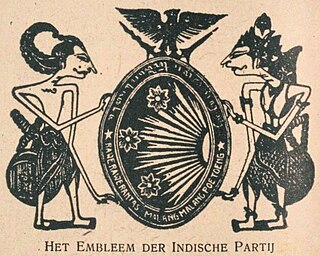
The Indische Partij (IP) or Indies Party was a short-lived but influential political organisation founded in 1912 by the Indo-European (Eurasian) journalist E.F.E. Douwes Dekker and the Javanese physicians Tjipto Mangoenkoesoemo and Soewardi Soerjaningrat. As one of the first political organisations pioneering Indonesian nationalism in the colonial Dutch East Indies it inspired several later organisations such as the Nationaal Indische Party (N.I.P.) or Sarekat Hindia in 1919 and Indo Europeesch Verbond (I.E.V.) in 1919. Its direct successor was Insulinde.

The Volksraad was an advisory, and later semi-legislative institution for the Dutch East Indies, provided for by law in 1916 but only established with the actual installation of the Council in 1918. It was a hesitant and slow attempt at democratisation of the Dutch East Indies as part of the "ethical policy" adopted by the Dutch government. The power of the Volksraad was limited as it only had advisory powers. Although part of the council was elected, only a small proportion of the population had voting rights.

Parindra was the name used by two Indonesian political parties.

Johannes Latuharhary was an Indonesian politician and nationalist of Moluccan descent, who served as the first Indonesian governor of Maluku from 1945 until 1955, though he did not assume office in Maluku until 1950. A Protestant Christian, Latuharhary was an early proponent of Moluccan inclusion in the Indonesian state and he was an active participant in the struggle for Indonesia's independence.
The Indonesian People's Movement, better known as Gerindo, was a left-wing and nationalist political party in the Dutch East Indies which existed from 1937 to 1942. It had modest goals and was largely cooperative to the colonial administration. More strongly anti-fascist than anti-colonialist, the party sought to support the colonial government in opposing fascism, especially Japanese fascism.
The Indonesian Islamic Party was an Islamic political party in the Dutch East Indies. Formed by dissenting members of the Indonesian Islamic Union Party (PSII) in 1938, the party was dissolved by the occupying Japanese in May 1942.
References
- Abeyasekere, Susan (1976). One Hand Clapping : Indonesian Nationalists and the Dutch 1939-1942. Centre of Southeast Asian Studies, Monash University. ISBN 0909835381.
- Cribb, Robert; Kahin, Audrey (2004). Historical Dictionary of Indonesia. Scarecrow Press. ISBN 978-0810849358.
- Kahin, George McTurnan (1952). Nationalism and Revolution in Indonesia. Ithaca, NY: Cornell University Press. ISBN 0-8014-9108-8.
- Tarling, Nicholas, ed. (1999). The Cambridge History of Southeast Asia. Vol. 1. Cambridge, UK: Cambridge University Press. ISBN 9780521663717.